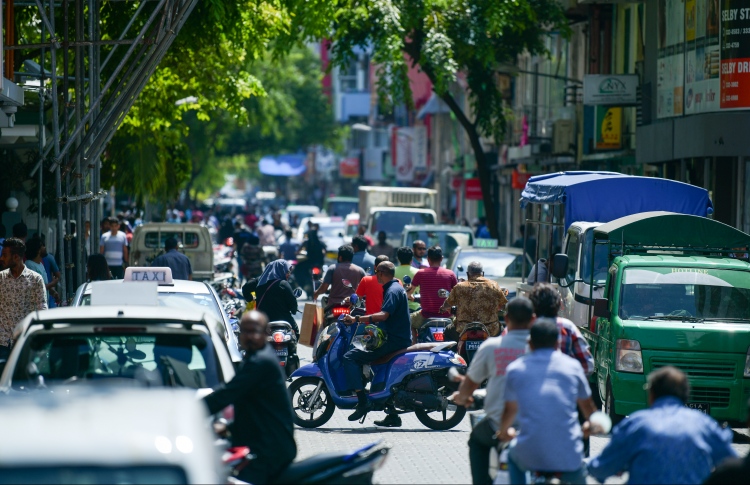The Government has announced a transformative budget for 2025, focusing on sustainable development, economic diversification, and social welfare enhancement. With strategic allocations in infrastructure, digital innovation, climate resilience, and healthcare and education, this budget reflects the administration’s commitment to securing a prosperous, resilient future for the Maldives and its citizens.

Infrastructure Development as an Economic Catalyst
One of the cornerstone priorities of the 2025 budget is infrastructure development, which has been allocated a significant MVR 1,536 million. This investment will be directed toward enhancing transportation networks, public utilities, and essential facilities across the Maldives. Improved infrastructure will ensure better connectivity between islands, benefiting trade, tourism, and public access to essential services.
The government aims to make substantial progress in transportation, sanitation, and water management, ensuring that citizens have access to quality infrastructure that supports economic growth and well-being. By building a strong infrastructure foundation, the Maldives hopes to attract more private sector investment, increase tourism appeal, and boost the livelihoods of island communities through improved access to markets and opportunities.
Digital Transformation and Economic Diversification
In line with global trends toward digitization, the Maldives has earmarked MVR 762.5 million for digital innovation as a central component of its economic strategy. The aim is for the digital sector to contribute 15% to the nation’s GDP by 2030, which will position the Maldives as a digitally empowered nation capable of competing in the global economy.
The allocated funds will support several key initiatives, including the development of digital infrastructure, the expansion of internet accessibility across islands, and workforce training programs in digital skills. The government’s emphasis on the digital economy not only aims to create high-value jobs but also aspires to foster a tech-savvy population that can engage in emerging sectors such as fintech, e-commerce, and remote work. This ambitious digital push is expected to provide diversified income sources and reduce economic dependence on tourism alone, providing stability and resilience for the Maldives’ future economy.

Environmental Sustainability and Climate Resilience
Given the Maldives’ vulnerability to climate change, environmental sustainability and climate action are top priorities in the 2025 budget, which dedicates MVR 900 million to initiatives aimed at bolstering climate resilience. This allocation will support renewable energy projects, such as the expansion of solar and wind energy installations, which will help reduce the nation’s carbon footprint and dependency on fossil fuels. Furthermore, a substantial portion of these funds will be invested in coastal protection projects, protecting inhabited islands from rising sea levels and storm surges, crucial for the Maldives’ long-term survival.
In addition to renewable energy and coastal resilience, the government’s environmental initiatives include waste management programs, eco-friendly infrastructure, and conservation efforts designed to protect the Maldives’ unique marine biodiversity. By investing in sustainability, the Maldives aims to establish itself as a global leader in climate action and maintain the natural beauty that underpins its tourism sector.
Social Welfare: Investing in Health and Education
The budget reflects a strong commitment to social welfare, allocating MVR 1,584.6 million to healthcare and MVR 3,045.6 million to education, the highest investment levels in these sectors in recent years. The healthcare budget will enable the improvement of facilities, provision of medical equipment, and expansion of healthcare services to ensure all citizens have access to quality care. This allocation also covers initiatives to attract skilled medical professionals and enhance specialized services across the archipelago, reducing the need for citizens to travel to the capital for essential care.
In education, the focus will be on infrastructure development, teacher training, and curriculum improvements that align with global standards. The government’s educational reforms will emphasize skills relevant to the future job market, including technical, digital, and vocational training programs. This approach ensures that the Maldives’ young population is equipped to thrive in a competitive global economy. The budget also includes scholarships and financial aid for higher education, creating opportunities for students to pursue studies in priority fields.
Addressing Economic Stability and Debt Management
The 2025 budget has also outlined a clear fiscal policy aimed at maintaining economic stability and addressing national debt. The Maldives’ GDP is projected to grow at a steady rate, with nominal GDP expected to reach MVR 140,821.8 million in 2025. However, as part of the government’s commitment to fiscal responsibility, the budget also includes plans to manage the national debt, which is anticipated to remain significant but stable.
To achieve this, the government is focusing on enhancing tax revenue, implementing cost-saving measures, and exploring new revenue streams beyond traditional sectors. Debt servicing measures include a commitment to improving public sector efficiency, prioritizing high-impact projects, and reducing unnecessary expenditures, all of which contribute to maintaining fiscal health while enabling transformative investments.

Empowering Local Communities through Decentralized Development
Another key aspect of the 2025 budget is the empowerment of local communities through decentralized development. The government has committed to supporting local councils with financial resources and authority to implement region-specific development initiatives. By giving more decision-making power to local leaders, the Maldives aims to foster self-sufficiency and address unique challenges faced by individual islands.
This decentralized approach is expected to drive equitable development across the nation, reduce urban-rural disparities, and encourage local innovation and entrepreneurship. It also enables communities to focus on projects that address local needs, such as improved public utilities, youth engagement programs, and island-specific tourism development.
A Vision for a Resilient, Inclusive Maldives
The 2025 budget of the Maldives is a forward-thinking blueprint that emphasizes sustainable growth, economic resilience, and social inclusivity. The government’s strategic investments in infrastructure, digital transformation, climate action, and social welfare demonstrate a commitment to a balanced approach that addresses both immediate needs and long-term aspirations. With a focus on diversifying income streams, protecting natural resources, and empowering local communities, the Maldives is on a path to building a resilient, inclusive future that benefits all its citizens.


